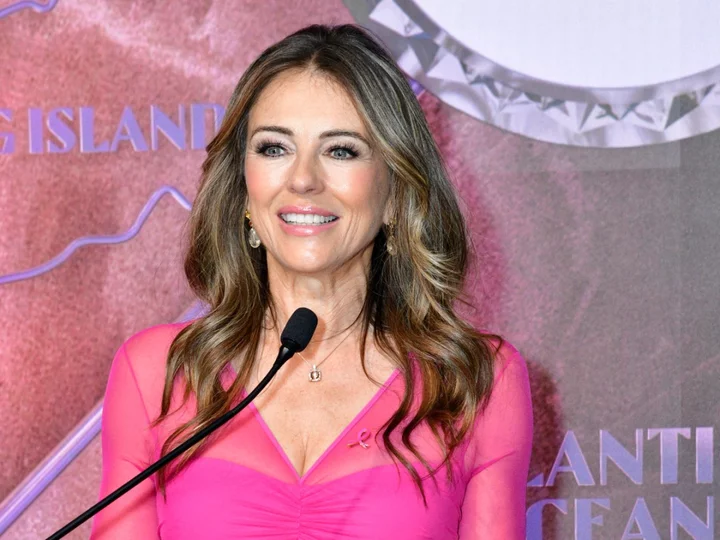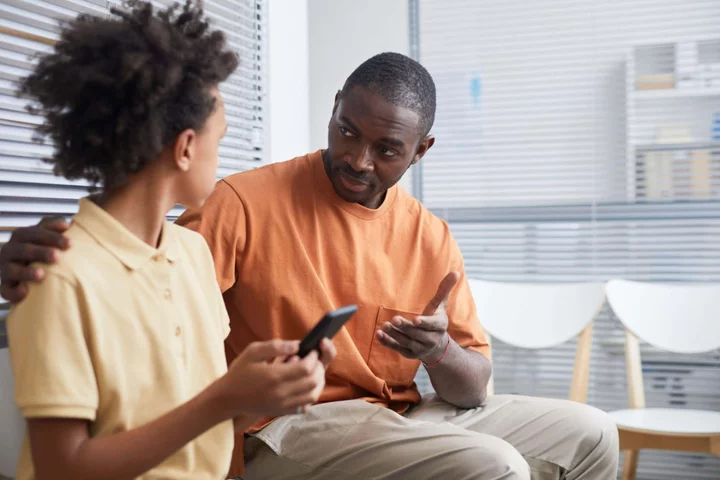
Nick Castellanos has perfect Philly mentality after gut-wrenching loss
Nick Castellanos isn't stressing the Philadelphia Phillies' Game 2 loss to the Atlanta Braves.
2023-10-10 12:26

How Austin Riley outsmarted Bryce Harper on Braves final out
Braves star Austin Riley can do it all. After hitting Game 2's go-ahead homer, he completed a wild double-play to end the game.
2023-10-10 11:29

First pitch: 3 things I heard from the Atlanta Braves on Tuesday around NLDS Game 2
The Atlanta Braves grabbed back the momentum from the Philadelphia Phillies, and here's what some of the Braves were saying after a big win.
2023-10-10 11:19

3 Phillies to blame for blowing it big time in Game 2 vs. Braves
The Philadelphia Phillies took a lead into the eighth inning of NLDS Game 2. Who is to blame for giving away what would have been a commanding series lead?
2023-10-10 10:49

Insane angle of Austin Riley’s game-winning homer shows Braves fans losing their minds
The Comeback Kids are back. The Braves beat the Phillies in Game 2 of the NLDS off of an Austin Riley game-winning homer.
2023-10-10 10:18

Braves fans lose their minds on Twitter after Michael Harris II series-saving catch
Atlanta Braves fans thought their season was close to over, as a loss would have forced them back to Philadelphia facing a two-game hole. Instead, Michael Harris saved the day.
2023-10-10 09:47

Max Fried wasn't the answer for Atlanta Braves in NLDS Game 2 against Phillies
The Atlanta Braves hoped to get a boost from the return of Max Fried. However, the southpaw's night was anything but uplifting.
2023-10-10 08:19

Elizabeth Hurley issues reminder to women about getting mammograms as she raises awareness about breast cancer
Elizabeth Hurley has issued a reminder to women about getting mammograms, in honour of her partnership with Estée Lauder’s Breast Cancer Awareness campaign. The model, 58, spoke candidly about mammograms – which are X-rays performed on women’s breasts to screen for cancer – during a recent interview withUs Weekly. While discussing her last 28 years as the ambassador of Estée Lauder’s campaign, she told women that if they feel something “abnormal” when examining their bodies, they shouldn’t hesitate to get it checked by a doctor. “I think the most important thing you can do is familiarise yourself with your breasts because they’re yours and only you know how they feel,” she said. “You should recognise something when it’s abnormal, and you should go to the doctor right away.” Hurley emphasised that annual screenings for breast cancer are not only “vital,” but they should be considered a part of “looking after your health in every way”. She also went on to urge women to be “breast cancer bullies” by continuing to encourage their loved ones to get checked for the disease. “Make sure your friends, your family, your mother, your grandmother, that they’re going for their screenings regularly and urge them to self-check,” she said. “It doesn’t discriminate. It can hit anybody. Some groups are more vulnerable than others.” She also made a reference to one breast cancer that can be difficult to treat, triple-negative breast cancer, which “differs from other types of invasive breast cancer” because “it tends to grow and spread faster, has fewer treatment options, and tends to have a worse prognosis”, as noted by the American Cancer Society. The type of cancer can also be “more common in women younger than age 40, who are Black, or who have a BRCA1 mutation”. “It disproportionately affects Black women,” the Bedazzled star added. “It’s a diverse disease and it needs to be attacked in a diverse way.” According to the American Cancer Society, women between the ages of 45 and 54 “should get mammograms every year”. Meanwhile, women who are 55 and older can either “switch to a mammogram every other year, or they can choose to continue yearly mammograms”. In addition, women between the ages of 40 and 44 “have the option to start screening with a mammogram every year”. The organisation also noted that breast cancer is the most common cancer in women, with estimates of “about 297,790 new cases of invasive breast cancer” being diagnosed in women in the US in 2023. Over the years, Hurley has continued to speak about the importance of getting a mammogram. Last year, she joined Loose Women hosts Kaye Adams, Brenda Edwards, Nadia Sawalha, and Carol McGiffin for a self-examination on live TV. During the segment, she also opened up about losing her own grandmother to the disease, and how her attitudes towards breast cancer have shifted over time. “At that time nobody talked about it. There was no pink ribbon, no Breast Cancer Awareness month,” the Serving Sara star said, adding that when her grandmother first found a lump in her breast, she didn’t go to the doctor because she was “scared and embarrassed”. “When she finally went it was quite progressed. But she still never talked about it,” the model continued. “It’s still a life-threatening disease for many women, but times have changed. We talk about it now.” During her interview with Us Weekly, she went on to celebrate her 28th year with Estée Lauder’s Breast Cancer Awareness campaign, noting that Estée Lauder’s daughter-in-law, Evelyn Lauder, is the one who first asked her “to get involved” with the mission. “That’s how it started, and I’m still here. We’ve raised $118m, 93 million of which went straight to research,” she said. “The rest went to education, medical services, support groups [and more]. It’s a phenomenal achievement.” Read More Big Brother narrator Marcus Bentley: Meet the man behind TV’s most recognisable voice ‘Not guilty’: Elizabeth Hurley reacts to rumours she took Prince Harry’s virginity Elizabeth Hurley slams British Airways’ ‘dodgy service’ after getting stuck in Antigua Like Sophie Anderton, I have felt the shame of struggling to have a child of my own How to spot if your child is struggling with their mental health – and what to do next How to get rid of bedbugs: Signs and symptoms amid threat of UK invasion
2023-10-10 05:25

Atlanta Braves looking to "new day" to bounce back in NLDS Game 2 versus Phillies
The Atlanta Braves may not be where they want to be heading into Monday's game, but they are confident they can turn the tide against the Philadelphia Phillies.
2023-10-10 04:56

Atlanta Braves make tweaks to lineup that directly respond to Game 1 failures
Atlanta Braves manager Brian Snitker tried to change things up in Game 1 and his offense sputtered. Will a return to normalcy reignite his team in Game 2?
2023-10-10 03:47

Exxon-Pioneer tie up could squeeze US shale oil suppliers, pipelines
By Arathy Somasekhar HOUSTON Top U.S. oil producer Exxon Mobil's planned acquisition of the No. 1 Permian shale
2023-10-10 01:48

How to spot if your child is struggling with their mental health – and what to do next
Spotting when your child is struggling with their mental health, and knowing how to support them, can be tricky for parents and carers. It’s an important issue to be aware of, however. According to the Children’s Society, in the three years up to 2022, the likelihood of young people having a mental health problem increased by 50%, while children and young people’s mental health charity Place2Be says one in six children experience mental health difficulties, rising to one in four amongst 17–19-year-olds. Emotional disorders including depression and anxiety are among the most common problems to crop up. James Emmett, regional clinical lead at Place2Be, says although the Government has taken “great strides” to address the issue by introducing support teams and senior mental health leads in schools, “we’re still seeing a sharp increase in diagnosable mental health conditions among children and young people, now affecting one in six children – which is around five in every classroom”. Stevie Goulding, senior manager for parents and carers services at the charity YoungMinds, says: “More young people than ever are struggling with their mental health and are in need of support. This generation is facing a unique set of pressures – living through a pandemic, a cost-of-living crisis and ongoing global instability – and they’re worried about their future. “As young people navigate the ups and downs of growing up, recognising when to be concerned about your child’s mental health can be difficult.” Here, Goulding and Emmett outline how parents can spot whether their child may be struggling, and how to help… 1. Look for behaviour changes A change in behaviour is usually the first sign that a child or young person is feeling low, says Emmett: “They may eat too much or not enough, have problems sleeping, or stop doing things they normally enjoy.” Goulding adds: “If you notice changes in your child’s behaviour or if they appear persistently distressed, it could mean they’re struggling with their mental health, and it’s important to take their concerns seriously.” 2. Give them the opportunity to talk Goulding suggests parents try to talk to their child or teen about how they’re feeling in a non-judgemental way. “Remember, they might not want to open up at first, so reassure them you’re there for them when they’re ready to talk. Remind them it’s ok for them to feel scared or unsure, and try to reassure them,” she advises. 3. Don’t force them to talk However, Emmett says sometimes they may not want to talk, adding: “It’s important that adults don’t force them to have a conversation they don’t want to have. Parents and carers must make sure they’re available – but don’t pressure them to talk. “It can be really tempting to ask a lot of questions, but it’s easy to slip into interrogation mode. Try to focus on the here and now and what would help moving forward.” 4. Choose your momentAvoid discussing the underlying causes of your child’s distress with them during intense moments, Goulding advises: “While it’s crucial to provide support, it can be more beneficial to address these topics when they’re feeling calmer.” 5. Ask how they’re feeling Ask if your child notices when they feel more or less sad, for example, at school, or when they’re with their friends and family, suggests Emmett. “Responding sensitively to your child’s signals with concern and interest will help them learn you’re there for them,” he notes. Goulding says parents can acknowledge their child’s feelings by saying something like: ‘It’s completely understandable that you’re feeling…’. She explains: “This helps to reassure them their feelings are valid and it’s ok to feel different emotions.” 6. Remind them of obstacles they’ve overcome in the past When a child or young person gets overwhelmed, they forget just how much they’ve already dealt with in their lives. “Tell them stories about how proud you were when they coped with certain moments in their life, such as an sitting an exam, or moving house,” says Emmett. “This will remind them of their resilience – their ability to adapt to difficult situations.” 7. Encourage them to stay active Physical and mental wellbeing are often linked. “This means doing something active can be a great way to boost your child’s mental health, and heading outside into green space can have even greater benefits,” says Emmett. He suggests parents walk or cycle short distances with their child instead of going in a car: “It’s cheaper and will help the planet to be healthier too.” 8. Model positive relationships Happy relationships between parents and significant adults lead to better mental and physical health for everyone, stresses Emmett. “By modelling positive relationships of your own, you can help your child to see what positive, healthy and meaningful relationships should look like – and to recognise when friendships aren’t positive,” he says. 9. Remind them how they feel will change Your child might not be able to see the light at the end of the dark tunnel they’re in. “Reassure your child that how they’re feeling is temporary,” says Goulding. “Things can change and they can feel better.” 10. Discuss what help is available Talk to your child about the different sources of help that are available, such as helplines, text lines and online chat services. “Reassure them it’s alright to confide in others, as young people often worry about upsetting their parents,” says Goulding. As well as YoungMinds parents’ helpline (0808 802 5544) and Place2Be, other sources include your child’s school, which will have a designated senior mental health lead, your GP who can refer your child to CAMHS, Parenting Smart, which provides free advice for parents and carers of 4–11-year-olds on how to support their child’s wellbeing and behaviour, and the free Shout 24/7 textline for anyone in crisis (text SHOUT to 85258). Read More Does your pillowcase make a difference to your skin and hair health? Sarah Jessica Parker channels Carrie Bradshaw on the red carpet in mismatched shoes Does your pillowcase make a difference to your skin and hair health? As transphobic hate crimes rise by 11% in a year, how to be a better ally Impact of relationships with AI chatbot programmes ‘worrying’, psychologist says Pokemon’s Detective Pikachu Returns and more top games of the week
2023-10-09 14:53
